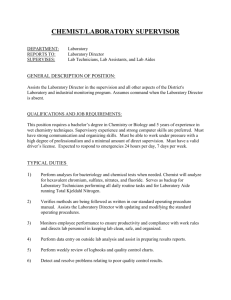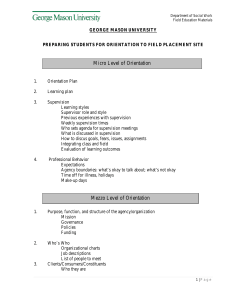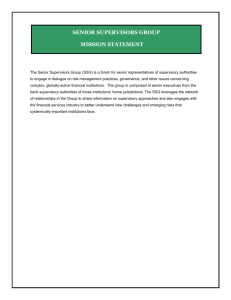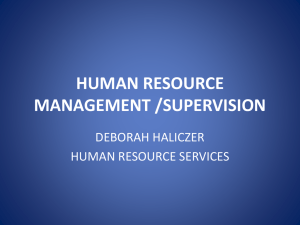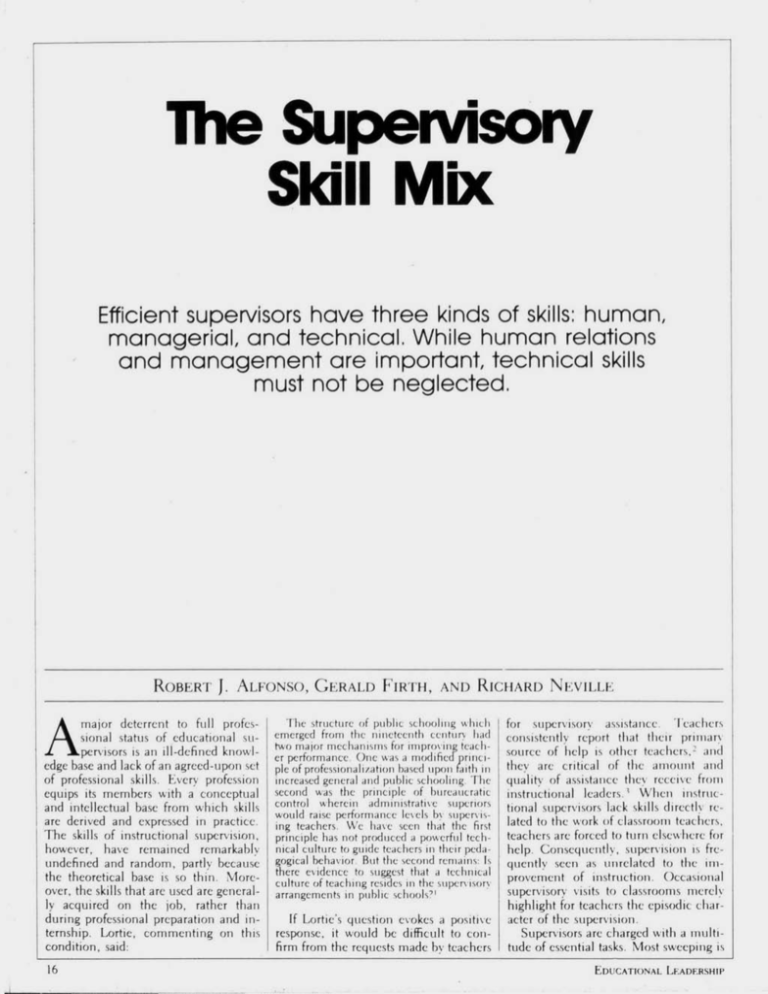
The Supervisory
Sldl Mix
Efficient supervisors have three kinds of skills: human,
managerial, and technical. While human relations
and management are important, technical skills
must not be neglected.
ROBERT
J.
ALFONSO, GERALD FIRTH, AND RICHARD NEVILLE
A
major deterrent to full professional status of educational supervisors is an ill-defined knowledge base and lack of an agreed-upon set
of professional skills. Every profession
equips its members with a conceptual
and intellectual base from which skills
are derived and expressed in practice.
The skills of instructional supervision,
however, have remained remarkably
undefined and random, partly because
the theoretical base is so thin. Moreover, the skills that are used are generally acquired on the job, rather than
during professional preparation and internship. Lortie, commenting on this
condition. said:
16
The structure of public schooling which
emerged from the nineteenth centunry had
two major mechanisms for improsing teacher performance. One was a modified principle of professionalization based upon faith in
increased general and public schooling The
second was the principle of bureaucratic
control wherein administrati-ve superiors
would raise performance lecels bs super-ising teachers. We hase seen that the first
principle has not produced a pow-erful technical culture to guide teachers in their pedagogical behavior. But the second remains: Is
there evidence to suggest that a technical
culture of teaching resides in the super isors
arrangements in public schools?'
If Lortie's question evokes a positive
response, it would be difficult to con-
firm from the requests made by teachers
for supervisory assistance. Teachers
consistently report that their primars
2
source of help is other teachers. and
thev are critical of the amount and
quality of assistance they receive from
instructional leaders.' When instructional supervisors lack skills directlh rc-
lated to the vwork of classroom teachers,
teachers are forced to turn elsewhere for
help. Consequently, supernision is frcquentlv seen as unrelated to the improvement of instruction. Occasional
supervisory visits to classrooms merely
highlight for teachers the episodic character of the supervision.
Supervisors are charged with a multitude of essential tasks. Most sweeping is
EDUCATIONAL LEADFRSHIP
their responsibility for improving instruction. They are expected to be instructional experts, diagnosticians, curriculum
developers,
instructional
planners, problem solvers, innovators,
clinical observation specialists, and
managers of the processes of teaching
and learning. In addition to these critical instruction-related tasks are a variety
of other school activities. Much of the
literature in instructional supervision
has addressed these supervisory tasks and
the "role" of supervision, yet it has given
too little attention to the identification
and development of the skills needed to
make supervision effective.
The field of instructional supervision
during the last three decades has emphasized the human relations and process skills of supervisors with only passing
reference to a larger repertoire that
might be required. The contribution of
Goldhammer, Cogan, Anderson, and
others4 in recent years to the development of clinical supervision is a refreshing departure from the days of admonition and description. Yet even they take
a rather narrov. view of where and how
supervision is to be played out. No
single skill or limited set of skills can
make supervision effective; instructional
supervision requires a wide array of
behaviors, demonstrated in a highly
complex, human organization, and undergirded by essential concepts and
knowledge.
Although the literature on instructional supervision in recent decades has
emphasized human relations, supervisors themselves have continued to engage in extensive management or quasiadministrative behavior. This is perhaps
understandable, considering the extensive physical structures and management systems required to run increasingly large and complex school systems.
While the focus of supervisory activity is
often that of self-selection or personal
preference, it may also be true that
supervisors have avoided classroom contact and direct attempts to influence
Robert I. Alfonso is Vice President of
Academic Affairs, East Tennessee State
University, Johnson City, Tennessee;
Gerald R. Firth is Acting Dean, College
of Education, University of Georgia,
Athens; and Richard F. Neville is Dean
ofArts and Sciences, University of Maryland, Catonsville.
APRIL 1984
instruction because they lack the skills
to do so. One does what is most comfortable and where success is most likely-or where the risk of failure is least.
A continuation of management oriented supervision is no longer feasible,
for the task of supervision now is to
refine the process of teaching and improve the effectiveness or the results of
schooling.
Three Types of Skills
Katz identified three basic skill areas for
administrators: human, technical, and
conceptual.' Mann, in extending and
restating Katz's work, described the
three classifications of supervisory skills
as human, technical, and administrative or managerial.6 In particular, he
emphasized the mix of these skills as the
key to supervisory competence.
Mann defined technical skill as the
specialized knowledge and ability required to perform the primary tasks
inherent in a particular supervisory position, and human relations skill as the
ability to work with people and motivate
them so they will desire good performance. Managerial skill is the ability to
make decisions and see relationships
that are crucial to the organization or
unit goals for which the supervisor is
"The
ip s r Ws-
sdill mix can be
applied to any
bainthe,
requiremenls at
dierent
organ utaonal
levels."
responsible.
The concept of the supervisory skillmix can be applied to any organization,
although there are different skill requirements at different organizational levels.
Mann noted that at first-line supervisory levels, technical and human skills are
of primary importance, while at higher
levels the need for managerial skills is
greater. He also found that the skill-mix
differs depending on the stage of growth
and development of an organization. In
a young organization, human relations
and technical skills are particularly essential, but as an organization matures,
managerial skills assume increased importance. Mann further observed that
technical skills are particularly crucial
during periods of change.
Examples
An example of a human skill is generating goal commitments. Instructional supervisors must be able to translate or
interpret organizational goals in such a
way as to cause teachers to be committed to them. This skill differs from that
of planning for goal attainment, which
is more of a managerial task. Clarifying
17
"It is not
surprising that
supervisors are
most effective
with managerial,
then human, and
last, technical
skills."
values is another example of a human
skill. Supervisors need not be expert in
values clarification, but thev should be
able to employ some of the techniques.
An example of a managerial skill is
needs assessment: helping teachers identify what they believe to be ideal and
then collecting data about how conditions really are. Needs assessment can
be a valuable contribution to a change
effort and an appropriate precursor to
planning, inservice, or staff development. Essentially, it is a planning tool
and therefore a managerial skill.
One technical skill is the ability to use
a classroom observation system. A wide
range of observation systems are available, and a supervisor ought to be competent in several of them. The purpose
of this skill is to better analyze and
understand the process of instruction as
it isexpressed in a given context or class.
It is directly related to the craft of
teaching, tales place on-site, and is a
clear example of a technical skill not
generally found in other professions.7
The components of the supervisory
skill-mix are not to be applied independently. It is the selection and application of an appropriate combination of
skills that makes instructional supervision effective; the mix is of far greater
importance than the individual skills.
The skill-mix can be applied to a variety
of professional roles, in schools as well
as in other formal organizations. Within
18
an educational organization, some of
the same skills might be found in several
different roles-principal, supervisor,
and curriculum director, for exampleand there might even be some skills
common to all. What distinguishes a
professional role, however, is the particular combination of skills and the frequency with which some of them are
used.
It is not surprising that supervisors use
and are most effective with managerial,
then human, and last, technical skills.
Although supervisors tend to rely too
heavily on them, managerial skills are
essential; they require the ability to develop and maintain an effective and
productive relationship between an individual unit (department, grade level,
or school) and the larger organization.
They also require a broad view and the
ability to go beyond immediate demands ir order to analyze comprehensive organizational developments and
needs. Through managerial skills the
supervisor is able to provide the conditions necessary for a teacher or staff to be
effective.
Managerial tasks are so demanding,
however, that they often divert the supervisor's attention from the application
of other skills in the mix. Using a
preponderance of managerial skills can
result in supervision that is long on style
but short on substance."
Similarly, human skills are a vital
part of supervision. The supervisor's
world requires working with and
through other people-it is a world of
influence and human interaction. The
human aspects of an organization also
are the most complex. Although human
skills can be overemphasized, they are
crucial. The supervisor who seeks to
create an atmosphere of support and
positive human relationships must be
sensitive to the needs and motivation of
teachers; this is basic to sound decision
making and effective intervention.
When people share a sense of purpose,
work cooperatively, and have a supportive management system, performance
and productivity are enhanced. Human
skills contribute to goal attainment
while enhancing the school as a human
system.
While all skills in the mix are essential, technical skills, more than any
others, make the role of the instructional supervisor unique. In all organizations, the closer one is to the work or
production system (in education, to ac-
tual teaching), the more frequently
technical skills are used. It is these skills
that are addressed precisely to the teaching act and allow supervisors to intervene with targeted, helpful behavior.
Supervisors need to work closely and
continuously with teachers. It is essential that they possess specialized knowledge and skills, including the ability to
demonstrate the skills they seek to develop in teachers. While teaching is a
highly humanistic endeavor, the refinement of instruction requires supervisors
who are both conceptually and technically strong.
By definition, a professional role is
skill oriented. 'he skills should be sufficiently different, easily recognized, and
clearly needed, so that the expertise of
the professional role is valued and
sought. The skills of a lawyer, a tax
accountant, or an opthamologist cannot
be found in the general populace. Similarly, within the school organization,
the supervisory mix needs to be so well
defined and demonstrated that there can
be no question about the need for the
role nor doubt of its cffectiveness.IE
'Dan C. Lortic, Schoolteacher A Sociological Study (Chicago: The Ulnivcrsity of
Chicago Press, 1977), p 74
-Robert J. Alfonso and Lee F Goldsberry,
"Colleagueship in Supervision." in Supervision of Teaching, ed. Thomas I Sergiovanni
(Alexandria, Va.: Association for Supervision and Curriculum Development. 1982),
pp. 90-107.
'Robert J. Alfonso, Gerald R. Firth. and
Richard F. Neville, Instructional Supervision: A Behavior System (Boston: Allvn and
Bacon, 1981), pp. 325-326.
4Robert Goldhammer, Clinical Supervision (New York: Rinehart and Winston,
Inc. , 1969); Morris Cogan, Clinical Supervision (Boston: Houghton and Mifflin. 1973);
Robert H. Anderson and Robert Krajewski,
Clinical Supervision, Special Methods for the
Supervision of Teachers (New York: Holt,
Rinehart and Winston, Inc., 1980).
'Robert L. Katz, "The Skills of an Effective Administrator," Harvard Business Review 33 (1955): 33-42.
hFloyd C. Mann, "Toward an Understanding of the Leadership Role in Formal
Organizations," in Dubin, Leadership and
Productivity (San Francisco: Chandler Publishing Co., 1965), pp. 68-103.
7A comprehensive list and discussion of
human, managerial, and technical skills
may be found in Robert J. Alfonso, Gerald
R. Firth, and Richard F. Neville, Instructional Supervision: A Behavior System, 2nd
ed. (Boston: Allyn and Bacon, 1981), p. 334.
lIbid., p. 337.
EDUCATIONAL LEADERSHIP
Copyright © 1984 by the Association for Supervision and Curriculum
Development. All rights reserved.


